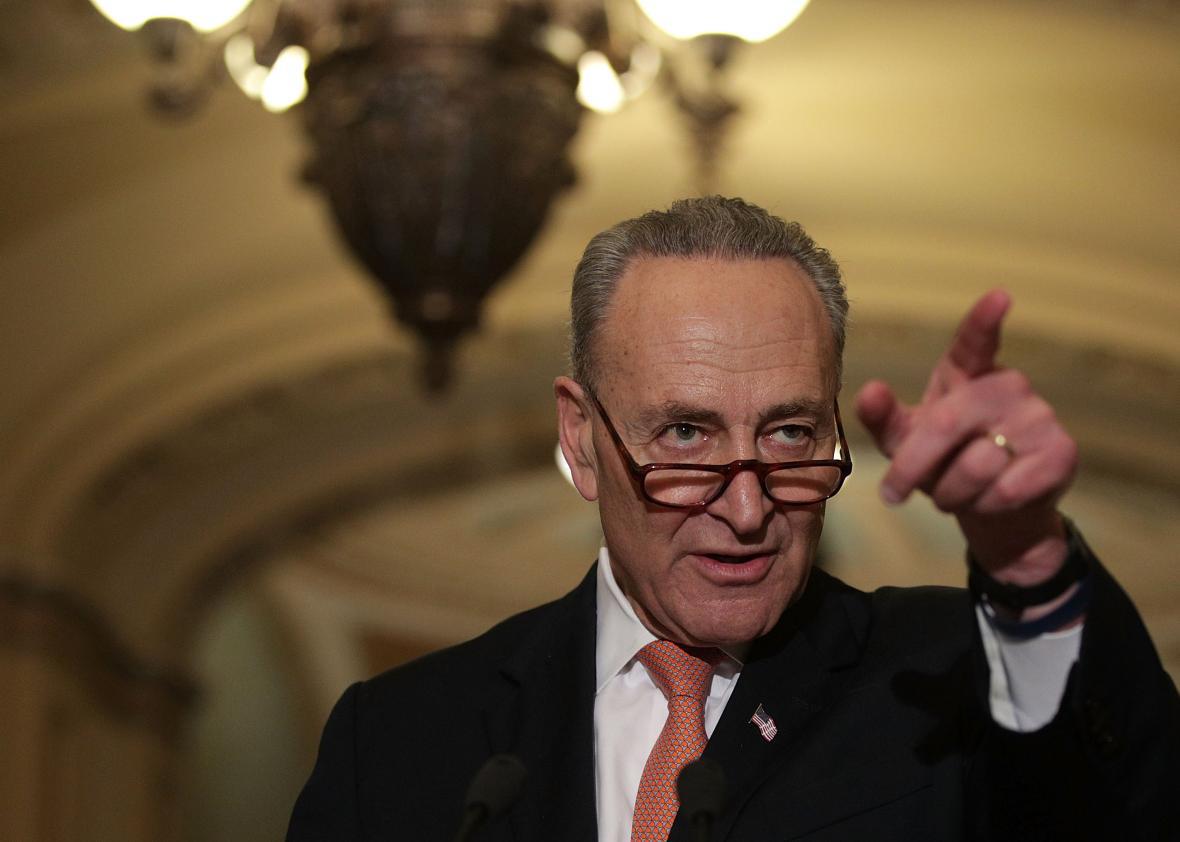On Tuesday, Senate Democrats will unveil a $1 trillion infrastructure plan they hope President Trump will support. From the New York Times:
Daring Mr. Trump to make good on his grand infrastructure promises, Senate Democrats on Tuesday will unveil a trillion-dollar plan to rebuild the nation’s roads, railways, airports, waterways and sewer systems over 10 years.
“From our largest cities to our smallest towns, communities across the country are struggling to meet the challenges of aging infrastructure,” Senator Chuck Schumer of New York, the Democratic leader, will say. “Our urban and rural communities have their own unique set of infrastructure priorities, and this proposal would provide funding to address those needed upgrades that go beyond the traditional road and bridge repair.”
The Democrats plan to pay for their plan with as yet unidentified tax loopholes. Trump backed a “$1 trillion” plan of his own during the campaign, but it was actually a plan to deliver roughly $140 billion in tax credits to construction firms that would generate investment and theoretically lead to $1 trillion in spending. In the white paper advancing his plan, Trump’s advisers argued that the credits would pay for themselves with the tax revenue generated by new economic activity.
One of the problems with Trump’s plan is that the private sector has few incentives to directly invest in public works that don’t generate steady profits—this is the reason why the federal government and state governments heavily invest in infrastructure in the first place. According to the Congressional Budget Office, there were only 26 private infrastructure projects completed or in progress in 2015. Even if a substantial number of new projects were spurred by Trump’s credits, there’s no guarantee that they would go to the areas where infrastructure is most desperately needed, as Wired’s Alex Davies noted in November:
A private player might be glad to build a toll road in a dense metropolitan area, says Edward Alden, a senior fellow with the Council of Foreign Relations. Indeed: A June survey found 71 percent of Southern California drivers would pay up to $20 per commute if they could drive a traffic-free, new expressway.
Something like that has plenty of appeal to the private sector. But other needs? Not so much. “If you’re talking about upgrading the water system in Flint, they won’t be clamoring to get involved,” Alden said.
The Democrats’ plan, by contrast, allocates federal money directly to specific areas over 10 years. “The plan dedicates $180 billion to rail and bus systems, $65 billion to ports, airports and waterways, $110 billion for water and sewer systems, $100 billion for energy infrastructure, and $20 billion for public and tribal lands,” the Times reports.
There, of course, may be folly in Democrats working with Trump on any infrastructure plan, as Jonathan Chait wrote in November:
Helping Trump pass a bipartisan bill that will spread prosperity is a gigantic political boon—one that will make it far more difficult for Democrats to contest either the midterm elections or Trump’s reelection bid. As I’ve noted before, it would be a mistake for Democrats to withhold cooperation unconditionally. Perhaps Democrats would trade this chip for something valuable. Say, Schumer could (as Ed Kilgore suggests) demand that Trump refuse to go along with the Republican plan to pass sweeping fiscal changes through a reconciliation bill, and instead work with his party across the board. That’s the sort of bargain that would make cooperation on infrastructure worthwhile.
In any case, a federal spending bill of the kind Democrats have proposed might not pass Congress even with Trump’s support. All major infrastructure proposals made by the Obama administration failed to pass except for a $105 billion highway bill passed in 2012 and a $305 billion highway bill passed in 2015. If Trump actually backs the Democrats’ plan, that will force the congressional GOP to either stand up to the leader of their party, or acquiesce.
The American Society of Civil Engineers estimates that $3.6 trillion are needed to fully revitalize American infrastructure by 2020.
